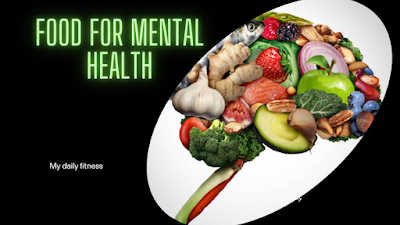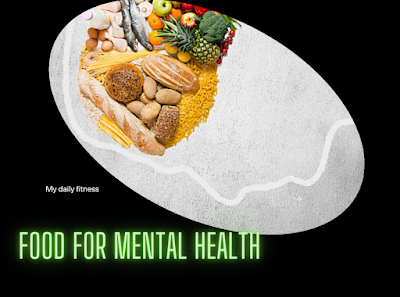Food for mental health
Eating a balanced and healthy diet is important for both physical and mental health. Here are some types of food that have been linked to positive effects on mental health:
Fatty Fish: Fish like salmon, mackerel, and sardines are rich in omega-3 fatty acids, which have been linked to reducing symptoms of depression and anxiety.
Whole Grains: Whole grains like brown rice, quinoa, and whole wheat bread contain complex carbohydrates that can help boost levels of serotonin, a neurotransmitter that is associated with feelings of happiness and well-being.
Leafy Greens: Leafy greens like spinach and kale are rich in vitamins and minerals that can support brain function and help reduce symptoms of depression.
Berries: Berries like blueberries, raspberries, and strawberries are packed with antioxidants, which can help protect the brain from oxidative stress and inflammation.
Nuts and Seeds: Nuts and seeds like almonds, walnuts, and chia seeds are high in healthy fats and other nutrients that can support brain function and reduce symptoms of depression and anxiety.
It is important to note that no single food can cure mental health disorders, and a healthy diet should be combined with other treatments recommended by a healthcare professional.
Nutrition's role in mental health,
Nutritional psychiatry is an emerging field that focuses on the relationship between nutrition and mental health. The concept is based on the idea that what we eat can significantly impact our mental health and well-being. There is mounting evidence suggesting that dietary factors play a crucial role in the development and management of mental health conditions, including depression, anxiety, and ADHD.
Several studies have linked poor nutrition to an increased risk of mental health disorders. For example, a diet high in processed foods, sugar, and saturated fats has been associated with an increased risk of depression, while a diet rich in fruits, vegetables, whole grains, and omega-3 fatty acids has been linked to a lower risk of depression and anxiety.
In addition, certain nutrients have been found to be particularly beneficial for mental health. For example, omega-3 fatty acids have been shown to have a protective effect against depression and anxiety, while vitamin D has been linked to a lower risk of schizophrenia.
One of the most significant advantages of nutritional psychiatry is its potential to complement other forms of mental health treatment. For example, medications and psychotherapy are effective for managing many mental health conditions, but they may not address underlying nutritional deficiencies or imbalances that could contribute to the development or exacerbation of symptoms. By incorporating nutritional interventions into treatment plans, clinicians may be able to enhance the effectiveness of existing treatments and improve outcomes for patients.
Overall, while the field of nutritional psychiatry is still relatively new, there is growing evidence to support its potential as a future approach to mental health treatment. By emphasizing the importance of proper nutrition for mental health, clinicians and researchers may be able to develop new and more effective strategies for preventing and treating mental health disorders.
Anwar said advocate.




No comments:
Post a Comment